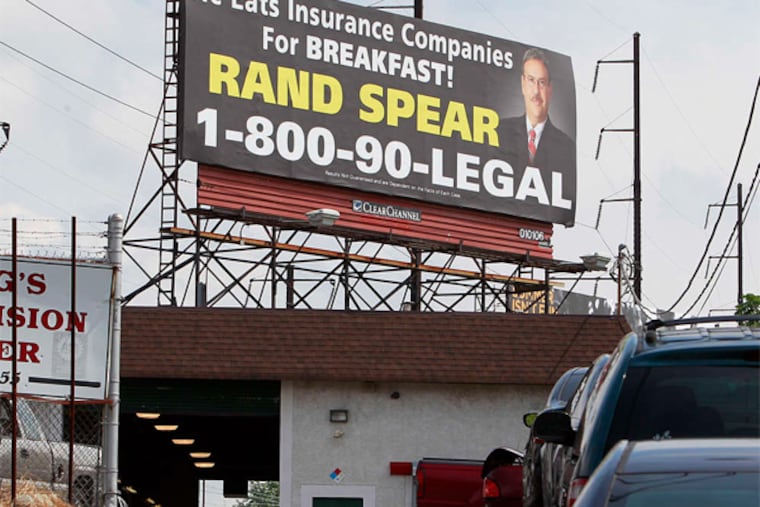Law Review: It's easy to see: Lawyers have embraced ads
The intense, searching eyes of Rand Spear beam out at you from a giant billboard as you drive north on I-95 in Philadelphia near the Cottman Avenue exit. It is really, really hard to look away, and that is the idea.

The intense, searching eyes of Rand Spear beam out at you from a giant billboard as you drive north on I-95 in Philadelphia near the Cottman Avenue exit. It is really, really hard to look away, and that is the idea.
"He Eats Insurance Companies For BREAKFAST!" proclaims the advertisement for Spear's personal-injury law firm, Spear, Greenfield & Richman P.C.
Yum! Can I have a side of subrogation with that and maybe an order of joint and several liability?
For decades, the rules of professional conduct banned attorney advertising. Lawyers thought of themselves more as public servants than as players in the grubby arena of commerce. Drumming up business was thought to be not only damaging to the image of the profession but also destabilizing to "societal repose," as one court opinion put it.
There is even a name for the offense of stirring up improper litigation: barratry.
Such restrictions were first merely a matter of etiquette but then became enshrined in professional ethics codes. For a time, lawyers not only were barred from advertising - the business was supposed to come to them, based on their stellar reputations - but some state bar associations also set minimum fee schedules.
But the ban on advertising was swept away in 1977 in the U.S. Supreme's Court ruling in Bates v. State Bar of Arizona, in which the court overturned ethics sanctions on two young lawyers in Phoenix for advertising their services.
The Supreme Court said restrictions on advertising functioned to deny legal services to people who didn't know where to turn, and probably caused them to be more expensive.
Legal services are still out of reach for many middle-income families. But it's hard to argue that the First Amendment free-speech protections shouldn't apply to lawyers in the same way they apply to reporters or average citizens, and everyone else.
And lawyers are hardly the only professionals who have thrown themselves into ad wars. Competing for your attention on I-95 are not only lawyer billboards but also a blur of advertisements by doctors and hospitals - promising cutting-edge therapies, the knees you deserve, and other treatments.
Spear, whose measured, friendly phone manner seems at odds with his fierce billboard image, is, in the parlance of the digital world, an early adapter. He's been advertising for 25 years, on cable television, in newspapers, and on billboards. Absent that kind of outreach, most middle-income people wouldn't know where to turn, he says.
"With advertising and competition, there is no comparison," Spear said. "The market has opened up. Competition in any industry is a healthy thing."
Spear maintains that the billboard slogan is all in fun. If Geico can advertise its insurance with its gecko gimmick, why can't plaintiffs lawyers be creative too?
And Rand Spear's billboard is only one example of a proliferation of advertising and marketing by lawyers. Lawyers compete among themselves to be named by legal rating agencies, and then blanket the universe with news releases when they are recognized. They hire public relations firms to tout their cases and pester reporters to write about them.
The biggest firms have large marketing departments that rack their collective brains to find ways to put their lawyers in front of potential clients at conferences and seminars.
What makes some people uneasy about all this marketing and advertising is that it flies in the face of the notion of lawyers, many of them anyway, as first and foremost battling to uphold justice. But the law has always been a business, too, a fact that was acknowledged in the Supreme Court decision.
What is the purpose of disguising the moneymaking side of the legal profession with advertising bans if every lawyer in every engagement discloses that anyway in the first conversation with a client, the Supreme Court said in its opinion.
To the concern that legal marketing instigates baseless lawsuits, the example of the Philadelphia Court of Common Pleas might offer a potential answer. Last year, in response to a spike in asbestos and pharmaceutical-injury lawsuits by out-of-state lawyers, John Herron, the trial division chief administrative judge, instituted procedural changes aimed at making Philadelphia a less attractive place to file a lawsuit.
The backlog of cases soon dropped dramatically, from a high of 2,690 in 2011 to 816 last year. The point is, courts and, to a greater degree, legislatures are the gatekeepers. If they are doing their jobs, flimsy cases will be turned away at the door.
There might be a problem of too many lawsuits, but lawyer advertising isn't the reason.